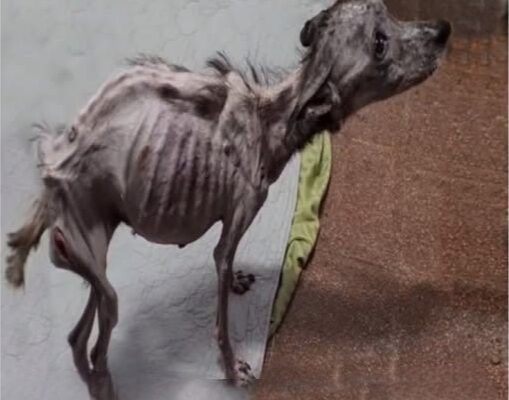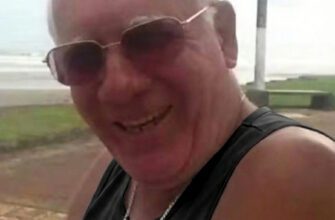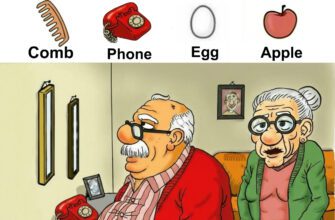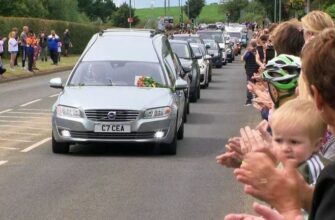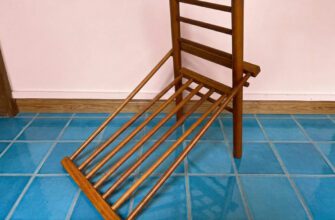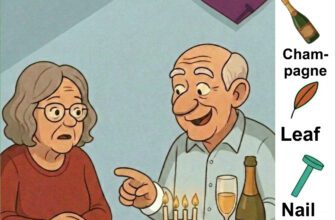She stood like a shadow, thin and fragile, by the wall of a cold office. I noticed her right away: bones under the skin, scars, the kind of look that doesn’t ask, but simply states the fact of existence. She was shaking, as if apologizing for her breathing, and trying to become smaller, to dissolve in the silence, in the rug under her feet that smelled of medicine and fear.
“Does she eat?” I asked quietly.
“Almost none,” volunteer Lena answered. “She drinks when no one is around. The doctors said there’s a chance.”
“What’s her name?”
“There was no name. We just called her ‘baby’.”
A name is a thread to the world. I crouched down and held out my hand. The dog stopped, a memory flashed in her eyes: “A hand is pain.” And yet her nose touched my fingers. For a second. Then a step back.
The doctor put a chart in front of me: critically underweight, anemia, dehydration, ticks, an old wound on her thigh. «You’ll have to be patient,» he said. I nodded. The word «must» rang inside me.

The drive home was silent. I drove carefully so as not to shake the carrier. Sometimes she sighed — hoarsely, shortly. I said: «This will be over soon, do you hear? It will be quieter now.»
She spent the first night in the bathroom. I sat on the floor and listened to the dripping water. She sat in the corner, as if afraid to take up too much air. I said: «You’re home. No one gets beaten here. No one gets driven out here.» She didn’t come over, but she stopped shaking.
In the morning, I made chicken broth and put the bowl out. I left. Twenty minutes later I returned — there was a shiny puddle at the bottom. She looked at me guiltily, as if she had stolen it. I smiled: «Eat without fear.»
The first few days were like unlacing a tight shoe. Each knot was a habit of being afraid, hungry, not sleeping. We learned touches: a fingertip to the cheek, a palm to the neck, short strokes along the spine so that she would not confuse warmth with an attack. A thin thread of interest appeared in her gaze, and this thread pulled us through the morning and evening.

A neighbor brought a blanket.
«Maybe it will be softer for her,» she said.
«Thank you,» I answered.
The dog poked her nose into the rough fibers, as if checking to see if they would bite. Then she lay down and fell into her first deep sleep. I sat next to her and listened to her even breathing. The world became quieter, as if someone had turned down the volume of evil.
I named her Nadya. Not because it was beautiful, but because this word brings you back to the light. Hope is moving forward, even when the step is the thickness of a palm.
The empty apartment had a different air. I stopped rushing. Cooked the rice longer so that the smell would reach her booth and call her to the bowl. Read aloud notes about slow things: rains, sticky buds, tea that cools and becomes sweet. She listened. And this «listening» was more important than grams and medicine.
We went to the doctor on the fourth day. The clinic smelled of sterile hope. The doctor, gray-haired, with kind eyes, felt her, and she trembled, but endured.
«She will live,» he said. «But living is not only eating and sleeping. She needs to understand that the world is not an enemy.
«I will try,» I said.
«Try together,» he corrected.
Every morning — a short walk. At first, five minutes. She walked as if the earth under her paws was a new language. She would flinch when the front door slammed. I would walk next to her and say what I wanted her to feel: “We’re going. We’re coming back. We have a home.”
Hunger was breaking her habits. The taste of food was no longer frightening. She began to eat in front of me — a little bit, but without taking her eyes off me. In the fifth week, I saw her carefully wagging her tail for the first time, as if checking to see if it would come off. That fragile wave was stronger than a thousand speeches about kindness.
Sometimes at night I dreamed that I saw her again in that corner of the shelter. I would wake up and listen to her snoring by the bed. “You didn’t pass by,” I would say to the darkness and smile.
We started rehearsing the game. I would throw a soft ball on the carpet. She would look at it as if it were a riddle, then come up to it and touch it with her paw. After a few tries, she took it in her teeth and brought it half a step away. I praised her: “Good girl.” Her eyes widened, as if she had never heard anyone call her that.
Her fur grew back, but the deepest scars were in her behavior. She was afraid of loud voices and sudden light. Someone laughed sharply on the stairs, and Nadya pressed herself against the wall, shaking. I sat down next to her, breathing slowly so that she would repeat my rhythm. The shaking subsided, her warm body trusted me, her head rested on my knee.
“You see,” I whispered, “laughter is not always pain. Sometimes it’s just people. And people are different. We will meet kind people.”
During the examination, the doctor smiled.
“Excellent tests. Another month, and no one will believe that this is the same dog.”
“Let them believe,” I answered. “Let them see what care is capable of.”
“Care and time,” he said. “And the fact that you named her Nadya. Her name is a staircase.”
We walked home, and I realized that I no longer looked back at every rustle. Nadya walked slightly behind, not out of fear, but out of respect for my speed. Sometimes she sped up to be next to me for a moment and touch my shoulder with her nose: “I’m here.”
Warmth entered her movements. She stretched in the mornings, comically arching her back. She fell in love with the sun and sleeping by the window. I stopped turning on the TV. Hearing her breathing turned out to be more important than any news in the world.
One day, a girl from the next door came to us.
“Can I pet her?” she asked.
“If she doesn’t mind,” I said.
The girl sat down and held out her hand. Nadya first looked at me, then took a step and laid her head on my palm. Thus, a new color appeared in our story — childish laughter without threat. The girl said, “You are warm.” This was the best description of a creature that had returned from the edge.
I once thought that kindness was an action: to bring, to give, to help. Now I understand: kindness is an environment in which you can breathe. I stopped expecting gratitude, because every look from her was the most honest gratitude. Past fears, a quiet “I believe,” and my own vulnerability were contained in that look. I changed too. My voice became softer, more attentive to people, more tolerant of their slow steps.
In the spring, we went out of town. The fields smelled of last year’s grass and the promise of new ones. I opened the car door, and Nadya paused, got out and raised her muzzle to the wind. The air filled her chest. And then she ran — at first awkwardly, then freely. She turned around, as if checking whether I could cope with her happiness. «I can cope,» I said and sat down on the grass.
«You know,» I said when she lay down next to me, «people often abandon those who walk slowly. But I can’t walk quickly. That’s why we suit each other.»
She snorted, as if in agreement, and closed her eyes.
Now, when we walk through the city, passers-by smile at her. She has become beautiful — not in an exhibition way, but in a homely way: with intelligent eyes that know the value of bread crusts and warm hands. Sometimes they ask: «Where is she from?» I answer: «From the place where strength ends,» and I see how the expressions on their faces change. People become more attentive to their steps. Maybe this is the main thing: by bringing one back to life, we gradually change many.
In the evening, I take out her first photo. There is almost no dog in it — only the geography of bones and emptiness. I put the photo down, and Nadya lays her head on my legs and seems to say with her eyes: «Don’t remember the pain as a sentence. Remember as proof of the path.» I nod: «Okay.»
We have a ritual. Every time she takes a new step — not being afraid of the elevator, enduring a loud bus, approaching a stranger — I say: «One more grain.» She bows her head. «A grain of what?» is heard in the silence. «A grain of peace,» I answer. «A garden grows from them.»
Sometimes acquaintances ask: «Where do you get your strength?» I don’t explain. I am sending a video of Nadya sleeping, her paws shaking as if she were running in her sleep. Strength comes from there — from simple confirmations that life can begin again and again.
I know: not all stories end happily. But happiness is not an ending, but a way to go. It has the smell of warm soup, the rustling of a blanket, a pause in the voice when you say «home» and this word becomes the key. We did not save the world. We saved the space between two hearts, and it turned out to be enough to live in.
This morning she brought me a ball for the first time. She stood in front of me, put her paws on her knees and looked so seriously, as if she was proposing a deal. I threw the ball into the hallway; it hit the wall. She came back, put the ball down and seemed to say: «I am ready to play. I am ready to live.»
«Let’s go, Nadya. A day without someone else’s pain and unnecessary screams awaits us. Only steps, water, sun and us,» I said.
She yawned and moved toward the door, cautiously as always, but without the same shadow. And it became clear to me: kindness is not a feat or a credit for glory. It is a discipline of the heart, a habit of noticing someone trembling by the wall and not passing by.
If suddenly it becomes too noisy for us, we will return to the first evening: the warm light of the kitchen, a bowl of broth, slow words. I will say: «You are home» — and this will not be a promise, but a rule of the world that we built together, where even scars can bloom. Sometimes I catch her gaze early in the morning, when the sun is just gaining strength. There is no emptiness in it anymore, only the quiet dignity of a survivor. She comes up and touches my palm with her forehead, as if noting the roll call: «I am here. You are here.» And each such moment confirms a simple truth: life returns where it is patiently awaited.
➕
